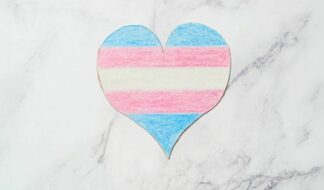by Bob Roehr
WASHINGTON, D.C. – "I am speaking Arabic, which obviously makes me a member of the Axis of Evil," Bleu Copas said as an English translation appeared on projection screens around the room. The former sergeant and Arabic linguist, kicked out of the Army for being gay, was a featured guest at the 15th annual national dinner of the Servicemembers Legal Defense Network in Washington, on March 24.
Copas had started work on a masters degree in counseling "but because of 9/11 I decided to put a pause on my studies and go serve my country." The Army spent more than two years and hundreds of thousands of dollars training him to speak Arabic.
He was gay and many of his fellow soldiers knew that; it did not matter to them. He didn't talk about it, obeying the anti-gay military policy known as "Don't Ask, Don't Tell". When he broke his leg playing intramural soccer for his company, "My buddies, all straight, had to get me in and out of the shower–naked. And it worked, I got clean and the Army did not fall apart."
Hoots and applause thundered throughout the cavernous National Building Museum, fittingly, originally constructed to process pension claims for Civil War veterans. More than a thousand people filled the space, a 50 percent increase over the dinner last year.
Copas was a member of the 82nd Airborne Division at Fort Bragg, North Carolina when anonymous emails to his commander accused him of being gay. "I was asked directly if I was gay," a violation of DADT. "I denied it at the time, I was scared to death."
He contacted SLDN "almost daily to discuss new information on my case. And, perhaps more importantly, I called to hear a friendly, supporting voice."
Copas hoped that it would all go away and that he would be able to continue with his career.
But as the investigation continued, "It got to that point where it was too dangerous for myself and also for the careers [of superior officers] to let me stay in. Upon my departure, my commander told me, 'This is the last thing that I want to do, I am not proud.' He knew what he was losing…It took two years and a bunch of money to train me, and that all went down the drain."
"The Army core values include respect, honor, and integrity. Those are in conflict with 'Don't Ask, Don't Tell.' It forces men and women to lie about who they are," he said.
Copas was given the Barry Winchell Courage Award, named after the solder murdered in his sleep in a gay bashing at Fort Campbell, Kentucky in 1999. He said, "If a scrawny little poor boy from the foothills of Tennessee can stick to his dreams, and help create change in the world, so can you. Let us unite to lift the ban."
The L word
Hollywood glitz was very much a part of the evening in the form of the producer and cast from "The L Word." The Showtime series on Los Angeles lesbians this year introduced the character Captain Tasha Williams, a returning Iraqi war veteran. The program garnered the Randy Shilts Visibility Award.
"I am deeply humbled to be telling this particular story, and honored to be here tonight among and on behalf of gay and lesbian Americans who actually risk their lives to perform a duty that they cherish" said Ilene Chaiken, the creator and executive producer of the series.
In an earlier conversation with reporters she said, "The 'L Word' tends to be liberal, kind of Hollywood lefty liberal, at times. We reflect our world and our point of view." She initially was not quite sure how the character of Williams would play out within the cast.
"We were a little surprised to find that she emerges as one of the most noble, admirable, steadfast, and compelling characters in our ensemble. [Only then] did we realize that we were telling the story of the military's unconscionable policy of discrimination, and harassment, and immoral disregard for the brave lesbians and gay men who serve this country."
Actress Pam Grier grew up "an Air Force brat" living on bases around the country and in England. She knew members in the service who were gay or lesbian, "but it was never talked about."
She chastised the military for clinging to a policy of discrimination based on sexual orientation. "I believe that freedom will win out. I believe it is inevitable."
Actress Cybil Shepherd said, "A woman putting her life on the line for our country was unthinkable a few years ago," and called the story a powerful one. She reminded the audience that she has been with the LGBT community a long time, helping to carry the banner at the head of the 1993 March on Washington.
Actress Marlee Matlin added, "While we're at it, let's continue to fight for marriage equality. It is f…ing so wrong, we are all Americans. Marriage equality and overturning 'Don't Ask, Don't Tell' go hand in hand."
Ending the ban
"With this story line of gays in the military, you are reaching an audience that we could never reach as advocates. We are greatly indebted to you," said SLDN executive director C. Dixon Osburn.
"Fact is stranger than fiction, which leads me to General Peter Pace," Chairman of the Joint Chiefs of Staff, and his comments that gays are immoral. "It reminds me of what Dorothy Parker said, "You can't teach an old dogma new tricks."
"Well, General Pace, 'Don't Ask, Don't Tell' is immoral. Kicking out good people in the time of war is immoral. Losing a leg in a land mine explosion is not useful, it is immoral. Seizing emails and diaries, [illegally] talking with their doctors, that is immoral."
"Allowing in those who have kidnapped, those who are murdered, but not allowing in qualified, patriotic gay Americans to serve our country, that is immoral."
Osburn said the House bill to overturn DADT has 115 cosponsors and a hearing will be held in June. A Senate version of the bill will be introduced shortly. SLDN scheduled scores of visits to congressional offices on March 26 to lobby for the legislation.
He said "We do not intend to force a vote until we are sure the votes are there to win. But what is clears is that it is just a matter of time."









